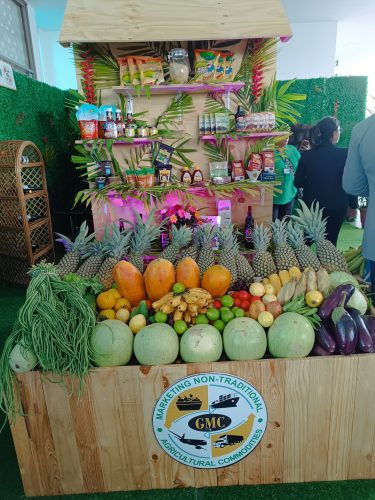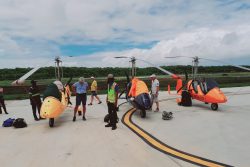President Irfaan Ali has emphasized the importance of addressing global issues such as hunger, malnutrition, and food insecurity.
As he addressed the gathering at the opening ceremony for the 38th Food and Agricultural Organisation (FAO) Regional Conference for Latin America and the Caribbean (CLAC), Ali stressed the need for a more equitable and fair global system, emphasizing the importance of data-driven decision-making in agriculture to combat climate events and ensure food security. He further assessed the need for reorganizing the global production system and implementing secure production systems to protect against vulnerabilities.

Speaking at the Arthur Chung Conference Centre, the President also touched on the issue of financing and insurance in agriculture, stating that concessional loans and financing should be available to support the global adaptation system. He called for greater integration and logistics in the region to ensure food security and reduce the impact of price fluctuations.
“If we had platforms that allowed us to store grains, just like we store fuel… many countries and many nations ensure that they have fuel supplies, storage facilities for eight months [to] twelve months to take care of any shocks to the system. Do we have any facility that can give us six months of grains in any region, six months of wheat in any region? So, whether it’s volatility in price, whether it’s unexpected shocks like war, we at least have some amount of storage capacity. But there is none. That’s why I said we have to look at the entire ecosystem…,” he challenged.
Giving an estimate of the impact poverty will have globally by the year 2030, Ali highlighted the importance of addressing malnutrition and ensuring access to water, food, and education for the 700 million people already living in poverty within the agricultural sector. He further underscored the environmental impacts of agriculture, such as water consumption and greenhouse gas emissions, urging for sustainable practices to mitigate these effects.
The Head of State also discussed investments in the agriculture sector, including increasing ownership of new plots by women and young people and expanding production in various industries. Ali also mentioned plans to address malnutrition and work with international partners such as Saudi Arabia, Brazil, and China to improve food production systems.
In highlighting the plight of those suffering in places like Haiti, Ukraine, and Palestine, he called for all present to stand and observe a moment of silence to reflect and pray for all those in need.
Ali highlighted ongoing efforts to establish a Centre of Excellence and a Food Production Systems School to support regional food security and sustainability. He emphasized the importance of collaboration with the private sector and international organizations to address global challenges and ensure a prosperous future for all.
According to a Department of Public Information [DPI] press release, Ali said “We cannot come here with the best ideas, and then forget that we have 700 million people who we represent living in poverty. How are we going to represent them, their rights, and their values after this conference ends? Food production is not just about food, it is about people who are involved in the system of producing food,” the head of state stressed. Added to this, the Head of State said that the agriculture sector is responsible for 70 per cent of the world’s water consumption and 30 per cent of global greenhouse gas emissions. “What is this conference going to say about that? What technology are we going to deploy? How are we going to ensure that we have availability of water and that our systems are built to better utilise water?” Ali questioned.
Ali lamented that these threats to the sector must be addressed during the conference’s discussions. “Many of us say we want to end hunger, starvation, and malnutrition. But if you look at our budgetary allocation, it does not reflect that will. If you look at the expenditure profile, it does not reflect that will. Political will is not only shouting out a message, it is about taking policy action and making policy intervention that addresses the issue,” he added. Guyana, he said, has increased its budgetary allocations in the agriculture sector from $13.3 billion in 2019 to $32.2 billion in 2023 representing an increase of 150 per cent and as a result, significant growth has been recorded in areas such as forestry, livestock, and fishing. In addition to increased and structured investments, the president said newer technologies must be implemented into food production operations. “The food production system involves technology, processing, transport and logistics, fabrication, and agriculture. But for me, the future of food production revolves around women and young people. How do we get women and youths more involved in the food production system?”
Ali said the government has already set a target for the country’s growing agriculture sector to ensure that 35 per cent of all new farms are owned by women and young people.
Meanwhile, Agriculture Minister Zulfikar Mustapha, who was also a keynote speaker, highlighted Guyana’s initiatives to transform its agriculture sector. These, he said, include programmes for entrepreneurship and innovation, self-sufficiency in livestock feed production, and infrastructure projects to support farmers. Mustapha also emphasized the importance of regional cooperation in addressing food and nutrition security, climate change impacts, and digital innovations in agriculture.
The conference, which concludes on Friday, will focus on promoting sustainable agriculture, increasing resilience and sustainability in the agri-food system, and addressing climate change issues. Participants will share also experiences and challenges in transforming agricultural systems and will work towards common goals for the region.










